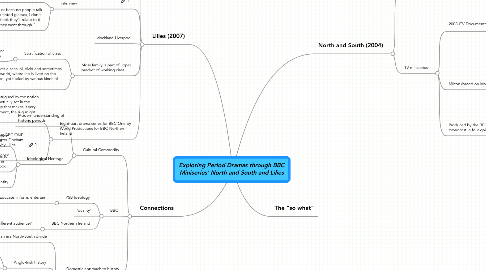
1. Lilies (2007)
1.1. Post WWI years; 1920's
1.1.1. "Lilies was not going to be a costume drama, but a drama about real people who happened to be dressed in period costumes was the ethos from the beginning" -Ralph Holes, Costume Designer
1.1.2. Past is not idealized
1.1.2.1. Economy depressed, no welfare state to fall back on
1.1.2.2. Opposite of 'et in arcadia ego' ideology
1.2. Brian McCardie/ 'Dadda Moss' interview
1.2.1. "The problem is that most period dramas are some unrealistic romance where people can't express their emotions and society doesn't allow young women, nearly always, to marry the man she loves...[they are] romances dressed up as literature."
1.2.2. "...lack of cliched sentimentality...just because people talk about looking at the past with rose-tinted glasses, I don't think people do, of that era, and I think they'll relate to it because they know the hardships they went through."
1.3. dockland Liverpool
1.4. Moss family is part of upper bracket of working class
1.4.1. Stratification of class
1.4.1.1. May Moss as chambermaid for aristocratic Brazendale family
1.4.2. "It depicts a sensual, vivid and sometimes savage world, where life is lived on the breadline, yet fueled by various kinds of love."
1.5. Eight-part drama series for BBC One by World Productions for BBC Northern Ireland
1.5.1. Producer, Chrissy Skinns was also intrigued by the notion of a contemporary drama which is actually set in the past: "It has a bold, dangerous edge that makes it very modern – the sense that at any moment, the rug might be pulled from under you."
1.5.2. Message from BBC ONE Controller Peter Fincham explaining why Lilies was not re-commissioned
1.5.2.1. "The BBC is committed to making a broad range of varied and ambitious drama. Part of this is achieved by us introducing new and exciting period drama to the schedules each year. But in order to achieve this we do have to move on from some pieces in order to allow new work to come through...Whilst we appreciate that these new dramas may not replace 'Lilies' in your affection we hope you enjoy them and that they show the BBC's continued passion for bringing you high quality period drama."
2. Connections
2.1. Cultural Commodity
2.1.1. Modern understanding of historic periods
2.1.2. Ideological Heritage
2.1.2.1. Not just tourism, shapes how Britain sees itself
2.1.2.1.1. New conception of British identity is hyper-reality
2.1.2.2. Period dramas generate ideas about what it means to be British, especially during economic hard-times as can be seen in both Milton/Manchester and Liverpool.
2.1.2.3. Northern England identity
2.1.2.3.1. Both dramas affirm resilience of working-class Brits
2.2. BBC
2.2.1. PSB Ideology
2.2.1.1. Educate, inform, entertain
2.2.2. 'quality'
2.2.3. BBC Northern Ireland
2.2.3.1. Caters to different audience?
2.3. Domestic approach to history
2.3.1. Victorian era North-South divide
2.3.2. Anglo-Irish history
2.3.2.1. Irish immigration into Liverpool
2.3.2.2. Michael Collins
2.3.2.3. Still relevant in present-day
2.3.3. Northern cities
2.3.3.1. Milton/Manchester
2.3.3.2. Liverpool
3. North and South (2004)
3.1. Book
3.1.1. 1855
3.1.2. Elizabeth Gaskell
3.1.3. "social novel"
3.1.3.1. Story explores issues of class and gender
3.2. TV miniseries
3.2.1. 2008 ITV Documentary
3.2.1.1. "It wasn't bodices, crinolines, and coaches; it was northern and gritty, making an unusual setting for a great romance."
3.2.1.2. "The landscape of North and South is incredibly gray and bleak and deliberately so...and then in the middles of it, you've got this really beautiful, blossoming romance." -Richard Armitage, 'John Thornton'
3.2.2. Milton (based on Manchester)
3.2.2.1. 1984 Miner's Strike
3.2.2.1.1. "From 1985 onwards the pit closure programme picked up speed. Margaret Thatcher had taken on the strongest union in the land and won."
3.2.2.2. Cotton Mill Strikes
3.2.2.2.1. Thornton's policies towards strikers very Thatcher-esque
3.2.2.3. Northern British Identity
3.2.2.3.1. Margaret able to perceive this because she is an outsider from southern England
3.2.3. Produced by the BBC and originally broadcast in four episodes on BBC One
